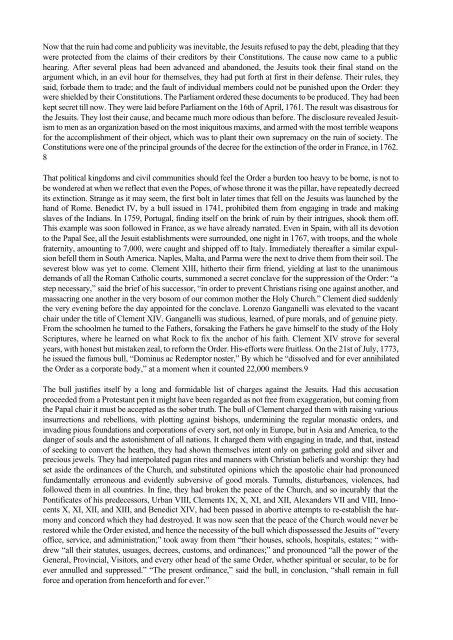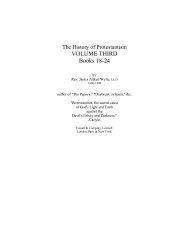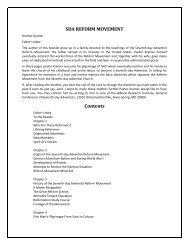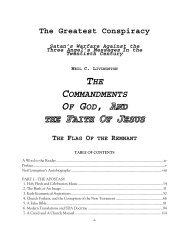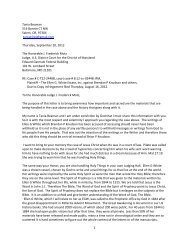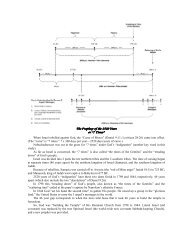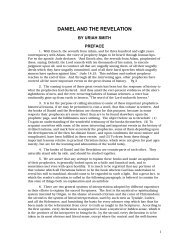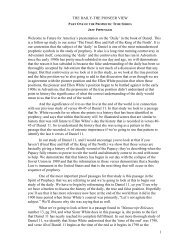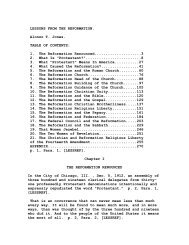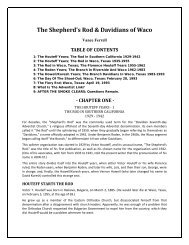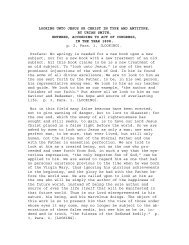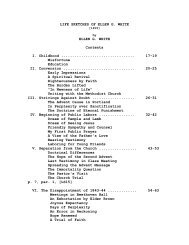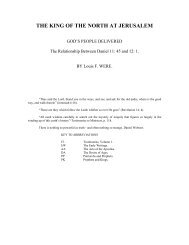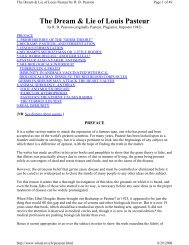History of Jesuits
History of Jesuits
History of Jesuits
You also want an ePaper? Increase the reach of your titles
YUMPU automatically turns print PDFs into web optimized ePapers that Google loves.
Now that the ruin had come and publicity was inevitable, the <strong>Jesuits</strong> refused to pay the debt, pleading that they<br />
were protected from the claims <strong>of</strong> their creditors by their Constitutions. The cause now came to a public<br />
hearing. After several pleas had been advanced and abandoned, the <strong>Jesuits</strong> took their final stand on the<br />
argument which, in an evil hour for themselves, they had put forth at first in their defense. Their rules, they<br />
said, forbade them to trade; and the fault <strong>of</strong> individual members could not be punished upon the Order: they<br />
were shielded by their Constitutions. The Parliament ordered these documents to be produced. They had been<br />
kept secret till now. They were laid before Parliament on the 16th <strong>of</strong> April, 1761. The result was disastrous for<br />
the <strong>Jesuits</strong>. They lost their cause, and became much more odious than before. The disclosure revealed Jesuitism<br />
to men as an organization based on the most iniquitous maxims, and armed with the most terrible weapons<br />
for the accomplishment <strong>of</strong> their object, which was to plant their own supremacy on the ruin <strong>of</strong> society. The<br />
Constitutions were one <strong>of</strong> the principal grounds <strong>of</strong> the decree for the extinction <strong>of</strong> the order in France, in 1762.<br />
8<br />
That political kingdoms and civil communities should feel the Order a burden too heavy to be borne, is not to<br />
be wondered at when we reflect that even the Popes, <strong>of</strong> whose throne it was the pillar, have repeatedly decreed<br />
its extinction. Strange as it may seem, the first bolt in later times that fell on the <strong>Jesuits</strong> was launched by the<br />
hand <strong>of</strong> Rome. Benedict IV, by a bull issued in 1741, prohibited them from engaging in trade and making<br />
slaves <strong>of</strong> the Indians. In 1759, Portugal, finding itself on the brink <strong>of</strong> ruin by their intrigues, shook them <strong>of</strong>f.<br />
This example was soon followed in France, as we have already narrated. Even in Spain, with all its devotion<br />
to the Papal See, all the Jesuit establishments were surrounded, one night in 1767, with troops, and the whole<br />
fraternity, amounting to 7,000, were caught and shipped <strong>of</strong>f to Italy. Immediately thereafter a similar expulsion<br />
befell them in South America. Naples, Malta, and Parma were the next to drive them from their soil. The<br />
severest blow was yet to come. Clement XIII, hitherto their firm friend, yielding at last to the unanimous<br />
demands <strong>of</strong> all the Roman Catholic courts, summoned a secret conclave for the suppression <strong>of</strong> the Order: “a<br />
step necessary,” said the brief <strong>of</strong> his successor, “in order to prevent Christians rising one against another, and<br />
massacring one another in the very bosom <strong>of</strong> our common mother the Holy Church.” Clement died suddenly<br />
the very evening before the day appointed for the conclave. Lorenzo Ganganelli was elevated to the vacant<br />
chair under the title <strong>of</strong> Clement XIV. Ganganelli was studious, learned, <strong>of</strong> pure morals, and <strong>of</strong> genuine piety.<br />
From the schoolmen he turned to the Fathers, forsaking the Fathers he gave himself to the study <strong>of</strong> the Holy<br />
Scriptures, where he learned on what Rock to fix the anchor <strong>of</strong> his faith. Clement XIV strove for several<br />
years, with honest but mistaken zeal, to reform the Order. His-efforts were fruitless. On the 21st <strong>of</strong> July, 1773,<br />
he issued the famous bull, “Dominus ac Redemptor noster,” By which he “dissolved and for ever annihilated<br />
the Order as a corporate body,” at a moment when it counted 22,000 members.9<br />
The bull justifies itself by a long and formidable list <strong>of</strong> charges against the <strong>Jesuits</strong>. Had this accusation<br />
proceeded from a Protestant pen it might have been regarded as not free from exaggeration, but coming from<br />
the Papal chair it must be accepted as the sober truth. The bull <strong>of</strong> Clement charged them with raising various<br />
insurrections and rebellions, with plotting against bishops, undermining the regular monastic orders, and<br />
invading pious foundations and corporations <strong>of</strong> every sort, not only in Europe, but in Asia and America, to the<br />
danger <strong>of</strong> souls and the astonishment <strong>of</strong> all nations. It charged them with engaging in trade, and that, instead<br />
<strong>of</strong> seeking to convert the heathen, they had shown themselves intent only on gathering gold and silver and<br />
precious jewels. They had interpolated pagan rites and manners with Christian beliefs and worship: they had<br />
set aside the ordinances <strong>of</strong> the Church, and substituted opinions which the apostolic chair had pronounced<br />
fundamentally erroneous and evidently subversive <strong>of</strong> good morals. Tumults, disturbances, violences, had<br />
followed them in all countries. In fine, they had broken the peace <strong>of</strong> the Church, and so incurably that the<br />
Pontificates <strong>of</strong> his predecessors, Urban VIII, Clements IX, X, XI, and XII, Alexanders VII and VIII, Innocents<br />
X, XI, XII, and XIII, and Benedict XIV, had been passed in abortive attempts to re-establish the harmony<br />
and concord which they had destroyed. It was now seen that the peace <strong>of</strong> the Church would never be<br />
restored while the Order existed, and hence the necessity <strong>of</strong> the bull which dispossessed the <strong>Jesuits</strong> <strong>of</strong> “every<br />
<strong>of</strong>fice, service, and administration;” took away from them “their houses, schools, hospitals, estates; “ withdrew<br />
“all their statutes, usuages, decrees, customs, and ordinances;” and pronounced “all the power <strong>of</strong> the<br />
General, Provincial, Visitors, and every other head <strong>of</strong> the same Order, whether spiritual or secular, to be for<br />
ever annulled and suppressed.” “The present ordinance,” said the bull, in conclusion, “shall remain in full<br />
force and operation from henceforth and for ever.”


